News
Carlsberg in hot water over price fixing in India
This article is more than 5 years old.
Competition authorities close in on three breweries in relation to the case

Carlsberg earned almost two billion kroner in Russia last year (photo: Pixabay)
Beer in India is no laughing matter, with sales in the country totalling over 40 billion kroner.
Of this, 88 percent of the market is accounted for by just three breweries: SABMiller, United Breweries, and Carlsberg.
Now, a report from the Indian competition authorities claims that, for eleven years, the three brewers implemented price agreements in full awareness of their illegality.
READ ALSO: Denmark’s organic exports set new record
Behind closed doors
According to the report, the breweries used the All India Brewers Association (AIBA) as a platform to negotiate prices, as well as using e-mails and the WhatsApp messaging services to make agreements.
There were at least three cases uncovered where management noted that their plans must remain a secret.
“We must avoid being discovered,” the director of AIBA informed brewery managers in one email from 2016.
Best made plans …
SABMiller was bought by AB Inbev in 2016 with the new owners discovering the price agreements in 2018. Upon the discovery, AB Inbev reported the case to the authorities.
AB Inbev and United Breweries told Reuters that they “take competition law very seriously” and therefore will “cooperate with the authorities”. Carlsberg refused to comment, citing the ongoing investigation.
It has not yet been decided whether the breweries will be fined in the case, but TV2 reports that anonymous sources estimate that the breweries could end up with fines of 1.5 billion kroner if found guilty.










































